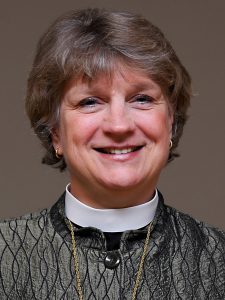
By Bishop Ann Svennungsen
What a weekend! On Saturday I was honored to convey the church’s deep gratitude at the funerals of John Nelson and Orval Westby, two pastors who’d been ordained for 63 and 73 years respectively. Seventy-three years! I’d have to live past 2055 to claim that.
On Sunday, I was privileged to preside at the ordination of Ian McConnell, someone I pray will serve as a pastor well beyond 2055. In the ordination sermon, Pastor Tania Haber spoke of the importance of imagination – quoting the Harvard commencement address given by J.K. Rowling: “Imagination is not only the uniquely human capacity to envision that which is not and therefore the fount of all invention and innovation; it is the power that enables us to empathize with humans whose experiences we have never shared.”
Imagination – and its fruits of vision and empathy – are critical gifts for pastors. Empathy is central to emotional intelligence; one of the most important skills for effective leaders. Trust is built on empathy, and without trust it’s almost impossible to lead.
BUT, EMPATHY IS ALSO essential for preaching. Pastor Fred Craddock, preaching professor at Candler School of Theology, encouraged preachers to imagine what it’s like to be situations unknown to them:
When the pastor writes a sermon, an empathetic imagination sees … concrete experiences. Others may display knowledge of “poverty programs” but the pastor knows what a bitter thing it is to be somebody’s Christmas project. [The pastor] sees a boy resisting his mother’s insistence that he wear the nice sweater that came in the charity basket. [The pastor] can see the boy wear it until out of mother’s sight, but not at school out of fear that he may meet the original owner on the playground. There are conditions worse than being cold. Others may discuss “the problem of geriatrics” but the pastor has just come from the local rest home and … still sees worn checkerboards, faded bouquets, large print King James Bibles, stainless steel trays, and dim eyes staring at an empty parking lot reserved for visitors. Others may analyze “the trouble with the youth today” but the pastor sees a fuzzy-lipped boy, awkward, noisy, wishing he were absent, not a man, not a child.
In his annual report to the synod, Pastor Orval Westby, then is his 90s, answered the question: What suggestions do you have for the ELCA? He wrote: “provide more opportunities for pastors to grow as preachers.”
“Even with all the vision and empathy in the world, regular preaching is a daunting task.”
I take his suggestion seriously. What opportunities encourage you in your preaching? What’s missing? Is there more our synod could do?
Even with all the vision and empathy in the world, regular preaching is a daunting task. I am eager to hear more about what sustains and stretches you. And, to explore ways our synod might be a stronger source of support.

